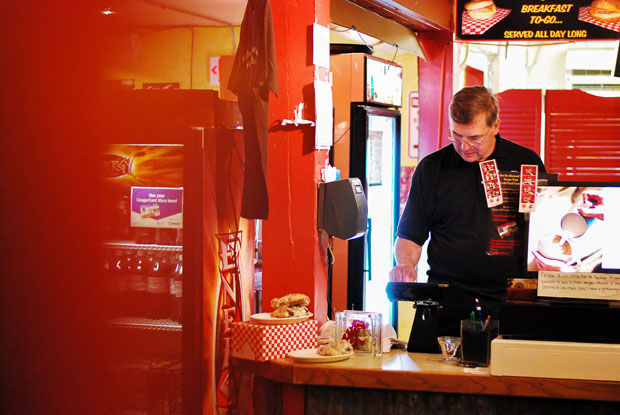Without a home
Mike Wagoner working in Zoe Underground, Oct. 9, 2014. Zoe’s Cafe is located on the back side of the interfaith house on campus.
October 16, 2014
Mike Wagoner got a phone call yesterday afternoon that said he won’t get an extension on his lease with the university; his popular coffee shop, Zoe Underground, will lose its basement home on Dec. 31.
Wagoner continues to run his business in the Interfaith House, a historic building that WSU purchased in May for $1.2 million. The building, which is roughly 90 years old, is slated to be demolished in May.
“The building will not be demolished until next spring, but the pre-demolition work will begin immediately after Zoe vacates that building,” said Kathy Barnard, the executive director of WSU communication. “There is other pre-demolition work that needs to be completed before that building comes down, including asbestos assessment and removal.”
Verizon, which maintains equipment and service towers in and on top of the Interfaith House, will be given until May to leave the building as the service does not interfere with the pre-demolition work, Barnard said.
Wagoner said he had hoped the university would play a part in relocating his business – perhaps to the ground floor of the CUB or inside the old Bookie, which is slated for renovation within several years.
Barnard said the university is preparing to replace the Cyber Café in the CUE and would consider a business proposal from Wagoner.
State law requires that the university consider all proposals, including ones from Zoe Underground and anyone else interested. However, Zoe currently serves alcohol, which can’t be sold anywhere on campus.
Wagoner was almost evicted in April, but a stir among some 3,000 patrons – many of them students – convinced the university to let him stay through December.
The notice he received on April 10 ordered his business out of the Interfaith House by the end of the month – even though he had signed for a three-year lease slated to end on Dec. 31.
At the time, the building was owned by a Presbyterian regional body called the Synod of Alaska-Northwest, which had approved WSU’s bid to purchase the building.
The property was being managed by another religious group called the Common Ministry Council, which began leasing to Wagoner in 2008 and hosted a number of churches and community groups upstairs.
The Synod, however, maintains that the Common Ministry never had legal authority to sublet the building and that Wagoner’s lease was null and void.
“There was no existing lease,” said the Rev. Dean Strong, the Synod’s stated clerk. “Unbeknownst to the owners, which was the Synod, the Common Ministry sublet the building to other tenants.”
Shortly after The Daily Evergreen reported this situation in April, WSU senior Laura Abbott launched an online campaign and petition to “save” Zoe Underground. Months later, the petition has accumulated nearly 5,000 signatures from patrons who demand that the university keep Zoe on campus.
“I love WSU and as a businessman I understand that we have to be good stewards and run the university in a business-like fashion,” Wagoner said. “But we can do that without tearing out its heart and soul.”
Wagoner said off-campus locations are tied up by current leases, and so “there is no place for Zoe to go” on Dec. 31.
“Of course, we think the best option would be to move us into the CUB,” he said. “Then, when the old Bookie is repurposed, we could open a satellite location there.”
Sean Greene, the executive director of the CUB, said he was mostly unaware of Wagoner’s idea to move Zoe into the space occupied by Reunion, another coffee shop and restaurant owned by the CUB and staffed by WSU’s Dining Services.
“Other than a second-hand comment to me mentioning that the Zoe owner wanted to move into the CUB, I had not been aware this desire,” Greene added in an email. “We have not reviewed any feasibility to change our existing food operations at this time.”
Wagoner’s proposal for a Zoe annex garnered vibrant support via the ASWSU’s Twitter campaign, #DearWSU, where numerous students have voiced concerns about the fate of the coffee house. But renovation of the old Bookie, where he hopes to open the satellite location, is still early in planning phases.
WSU adopted its most recent master plan for the Pullman campus in 2012, before the Interfaith House went up for sale.
Barnard said administrators respect the students’ opinions about the situation, but state laws require the university to follow protocol when evaluating proposals for new businesses on campus.
Wagoner, who graduated from WSU in 1978 with a bachelor’s degree in education, has lived and worked in Pullman for most of the last 36 years.
“After graduation I stayed close to this campus and have probably been here longer than most of the current administration dealing with this, so I’ve seen many changes,” he said. “I myself can’t do anything now, but I feel like the community could.”





















